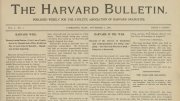During April, the extended University community—in Greater Boston and around the globe alike—are invited to participate in the Harvard Alumni Association’s public service initiative, “Harvard Serves.” Inspired by President Drew Faust’s exhortation to apply “our knowledge to help advance the well-being of people in the world beyond our walls,” the HAA hopes to mobilize all 300,000 alumni worldwide, as well as faculty and staff members and students, to volunteer time and efforts in their own communities.
Events will be organized through local Harvard clubs, Shared Interest Groups, and individual classes; organizers will choose one or more dates during the month of April for their service opportunity. Anyone with suggestions about local community organizations in need of volunteers, or eager to get involved with planning these events, should e-mail harvardserves@post.harvard.edu. A full list of service opportunities and specific dates of projects and their locations will be available at alumni.harvard.edu on March 1.








